The lives of older people experiencing homelessness, particularly older women, will improve markedly if the New South Wales Government moves to implement the recommendations handed down today by the Social Issues Committee inquiry into homelessness amongst older people aged over 55, according to Housing for the Aged Action Group (HAAG).
The recommendations contained in the Standing Committee on Social Issues’ final report were endorsements of almost all positions recommended by NSW Ageing on the Edge Forum, a coalition of about 140 members and supporters in New South Wales including housing and homelessness and community sector organisations, peak advocacy bodies and individuals with lived experience, which HAAG coordinates.
The key recommendations of NSW Ageing on the Edge Forum endorsed by the Committee include:
- Funding a specialist older person’s housing information and support service that comprises both an early intervention and crisis response, similar to HAAG’s Victorian Home at Last service.
- Build more social and affordable homes that meet the needs of older people.
HAAG Executive Officer Fiona York welcomed the final report and said the Government now must act.
“This report and its recommendations provide the New South Wales Government with a foundation upon which to build a meaningful response to homelessness among older people,” she says.
“Services like Home at Last succeed in preventing people from reaching crisis point. So it’s particularly pleasing to see the Committee recognise how a similar service could benefit people in New South Wales.
“While it’s great the Committee is calling for more social and affordable housing, we would have liked that recommendation to be more specific. Many governments have promised to build social housing, only to fall well short of what’s required. New South Wales needs 50,000 social and affordable homes built over the next 10 years, and at least 20% must be dedicated to older people.”
Other promising recommendations made by the Committee include;
- review unnecessary burdens like ‘seeker diaries’ placed on those accessing temporary accommodation
- increase transparency by improving the availability of housing-related data,
- Government to consider easing strict documentary evidence for housing applications for Aboriginal and Torres Strait Islander people, older people from migrant and refugee backgrounds, and older women fleeing domestic and family violence.
“Today many older people, and particularly older women, are struggling to stay housed in New South Wales,” York says.
“For too they’ve had to jump through punitive and unnecessary hoops in order to get access to housing.
“If the Government takes these recommendations seriously and implements them in full, it will give them a much better chance at securing a stable, affordable home.”
HAAG was also pleased to see report recommended the Government investigate lowering the age limit for access to the Housing Elderly Persons priority age group from 80 years to 55. The committee’s concern about the impact that change might have on other priority groups, speaks to the fact there is not enough social housing.
“It’s unacceptable that a single, older women must wait until she is 80 years old before she is considered a priority for social housing,” York says.
It’s not just the recommendations of the Committee that New South Wales policy makers can learn from, York said. She commended the Committee for the way it involved people with lived experience of homelessness throughout the process.
“This kind of genuine consultation of older people with lived experience of housing stress and homelessness is exactly what’s required to improve policies that impact their lives the most,” York says.
“We thank those people who came forward and shared their experiences of homelessness and housing stress with the Committee.”
“We are looking forward to working with the New South Wales government, alongside these women and the rest of the sector, as it works to implement these recommendations.”



 "There is nothing like staying at home for real comfort."
"There is nothing like staying at home for real comfort."